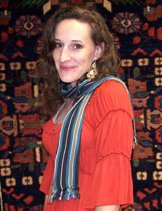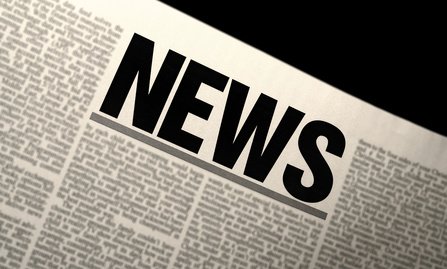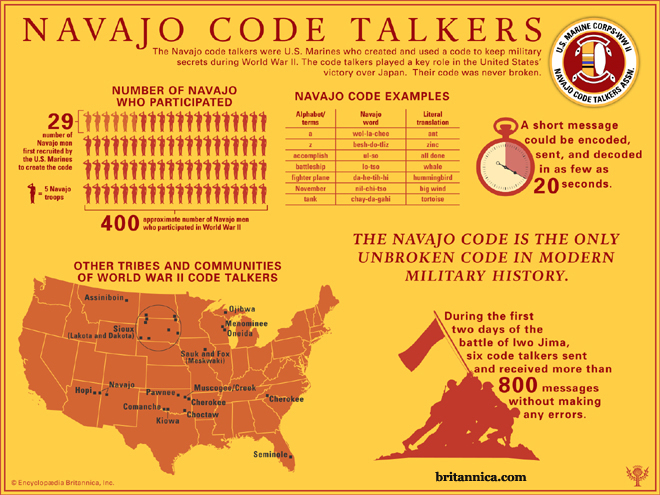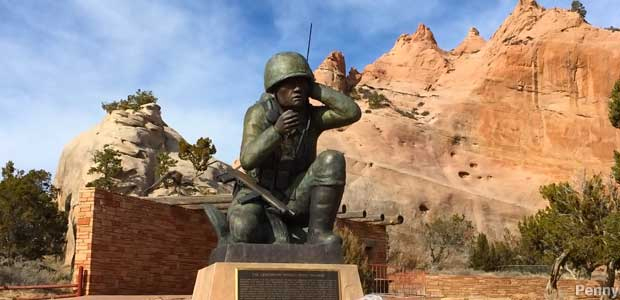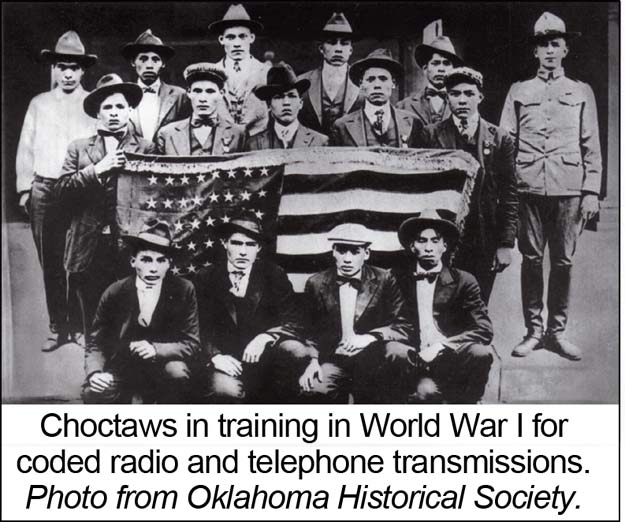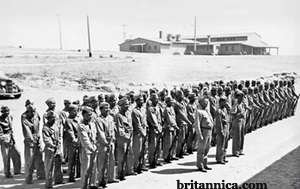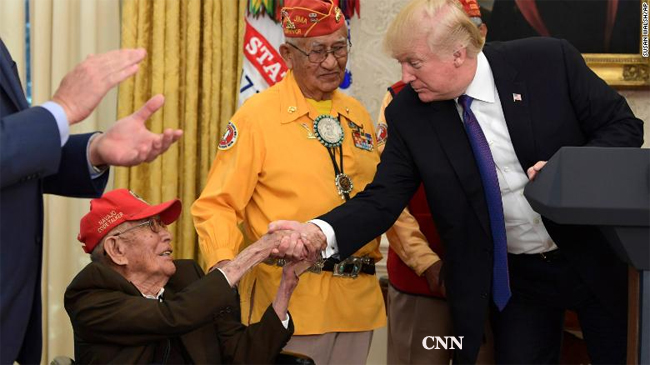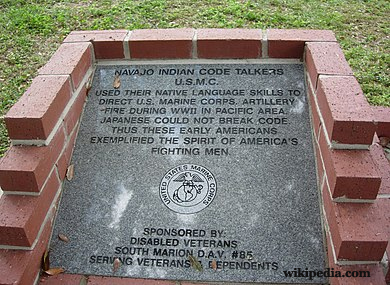INTERNATIONAL NAVAJO CODE TALKERS DAY...
AUGUST 14
Navajo Code Talkers were credited with making it possible to win the war in the Pacific. These men, whose work was kept a top secret for 26 years after the war, have now been celebrated with movies, medals, and even a special day, August 14.
THE NAVAJO LANGUAGE -
COMPLEX and OBSCURE
The unique contributions of the all-Navajo 382nd Marine platoon were possible because they spoke one of the most complex and obscure languages in the world.
The Navajo language is from the Athabascan language family, about 44 separate North American languages spoken by indigenous people in Canada and Alaska, on the US Pacific coast, and in the US Southwest.
Navajo is exceptionally complex. Even missionaries rarely achieved fluency. Philip Johnston, a non-Navajo civil engineer who proposed the Navajo Code Talkers program in 1942, stated that fewer than 30 non-Navajos in the world could understand Navajo. Johnston was born to missionaries on Navajo land and attended Navajo schools as a child. He was perhaps one of the most fluent non-Navajo speakers but Code Talker, Chester Nez, once said that Johnston's accent and grasp of nuanced grammar were nonetheless imperfect.
Navajo has four tones in the language so that pitch can change the meaning of a single word. Each word is highly complex, using prefixes, suffixes, and verb stems to convey full sentences. One Navajo verb can convey a complex thought.
Verbs can also convey such things as also convey such things as object shape. "Carry a round object" would be different than "Carry a flat object." Each verb has special conjugations for aspect, mood, and subject/object agreement.
Today, Navajo is one of the healthiest Athabascan languages with 170,000 people letting the 2020 census know they spoke Navajo. In the 1950s, it was estimated that only 50,000 speakers existed.
If you would like more information on the Navajo Code Talkers, please read our article here.
NAVAJO CODE TALKERS
WERE NOT THE ONLY
NATIVE AMERICAN CODE TALKERS!
Navajo wasn't the only Native language used for code talk. During World Wars I and II, Native American code talkers used their unwritten, complex languages to transmit messages that enemy forces, particularly German and Japanese intelligence, could not decipher.
Among these, the more than 300 Navajo Code Talkers, celebrated each year on August 14, are the most famous, but they weren't the only Native American Code Talkers.
CHOCTAW CODE TALKERS
The Choctaw were the first documented Native American Code Talkers in World War I (1917-1918). The German army had cracked US codes and tapped telephone lines, so eight Choctaw soldiers in Company E, 142nd Infantry, were assigned to transmit messages in their language during the Meuse-Argonne Offensive (October 1918), a critical campaign.
In 1989, the French government awarded the Choctaw Nation the Chevalier de l'Ordre National du Merite for their role.
In 2013, the US Congress awarded Congressional Gold Medals to code talkers from 33 tribes, including the Choctaw, recognizing their World War I service.
COMANCHE CODE TALKERS
Recruited in 1941, the Comanche served as code talkers in the US Army's 4th Infantry division during World War II. The Comanche developed a code with about 250 terms, combining direct translations and coined phrases. For example, 'tukomoo' (black) denoted a tank, and 'wakaree' (turtle) meant a tan destroyer.
HOPI CODE TALKERS
During World War II, about 11 Hopi Code Talkers served in the Pacific, Philippines, and New Guinea. Their language's unique phonology and grammar made it indecipherable to enemies, but because there were so few speakers, the program couldn't be expanded.
MESKWAKI
(Iowa Sac and Fox Nation)
CODE TALKERS
In World War II, the Meskwaki Nation (consisting of the Sac (Sauk) and Fox Nation in Iowa), provided 8 soldiers as code talkers, representing 7 percent of the tribe's male population. They made significant contributions in North Africa.
OTHER TRIBES PROVIDING
CODE TALKERS
Less well-documented are the World War II contributions of the Cherokee, Lakota and Dakota (Sioux), Creek (Muscogee), Chippewa (Ojibwe), Kiowa, Pawnee, and Seminole.
AUGUST 14
So, on August 14 of every year, let us continue to remember the Navajo Code Talkers, but let us not forget the many other Native American tribes that contributed to the fight for our freedom as well.
Top of International Code Talkers Day
"The Cleanest Clean You've Ever Seen."
by
ABC Oriental Rug & Carpet Cleaning Co.
130 Cecil Malone Drive Ithaca, NY 14850
607-272-1566
